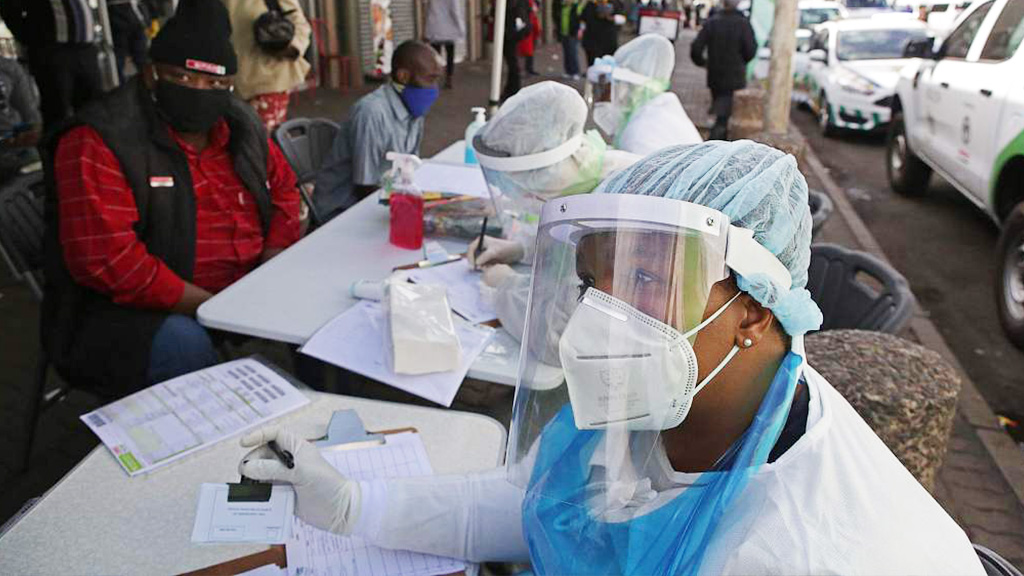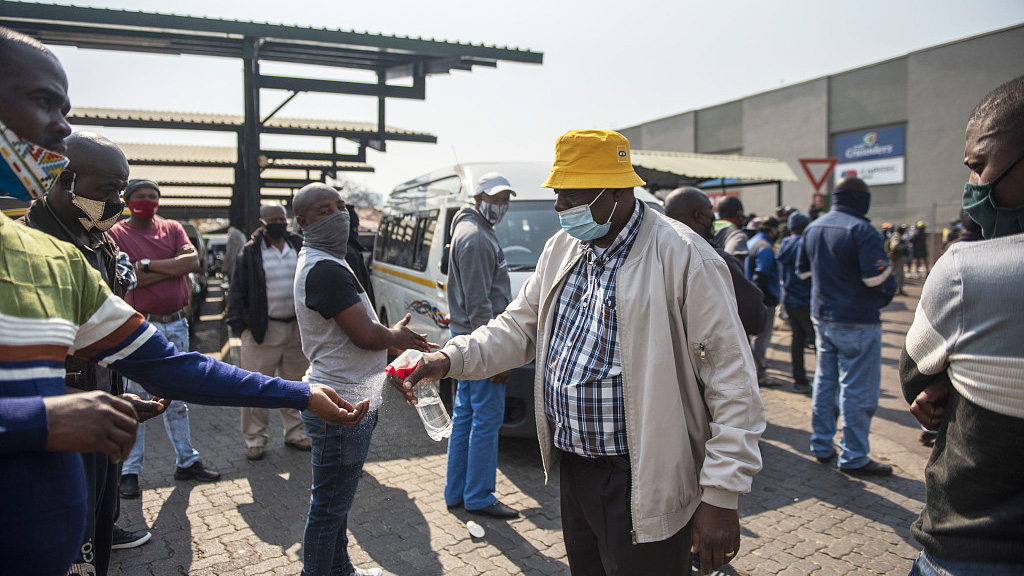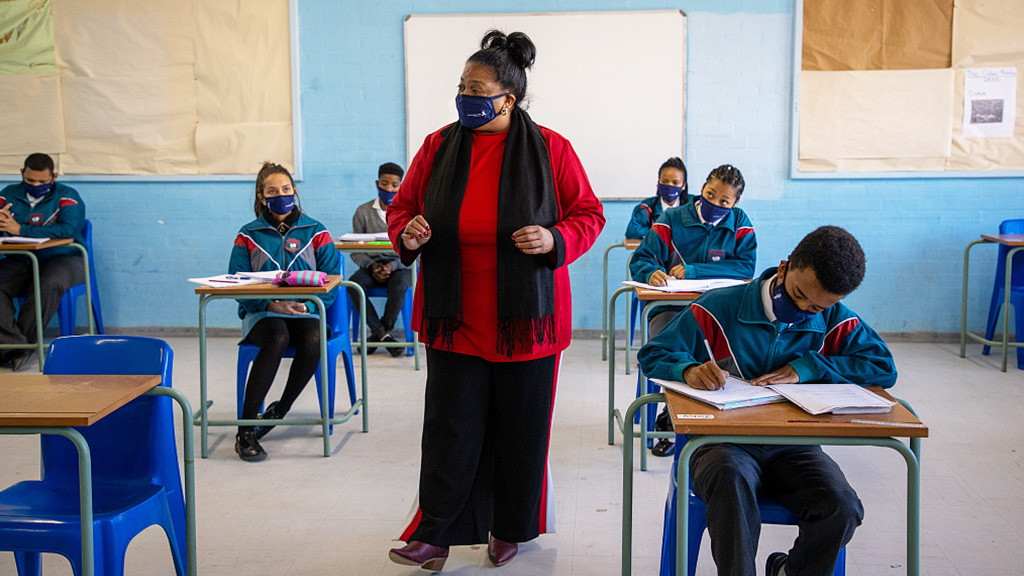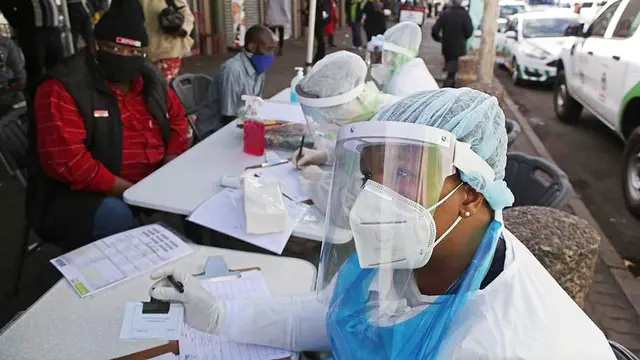These days, maps depicting Africa's coronavirus caseload highlight the southern tip of the continent. South Africa, despite initially faring well as the pandemic reached its soil earlier this year, is now a COVID-19 hotspot with the fifth most cases in the world, forcing the government to reinstate some lockdown measures earlier this month, which were initially eased on May1. But why the reversal in fortune?
The downside of being sub-Saharan Africa's most industrialized nation
South Africa, often considered sub-Saharan Africa's most industrialized nation, has suffered a more severe outbreak of the new type of coronavirus than its neighbors partly because of this very reason.
Being the most globally connected country in the southern African region resulted in coronavirus cases arriving sooner, and in more than one location. South Africa recorded its first case on March 5 in a man returning from Italy, though the country's COVID-19 epicenter has since shifted location; first hitting Cape Town's province of Western Cape hardest but later moving to Guateng in the north east of the country, the province that is home to Johannesburg, South Africa's most populous city, and Pretoria.
The country currently has 421,996 cases – over half of the total on the African continent – and has suffered 6,343 deaths, according to official figures. But, the true situation could be worse. South Africa suffered 17,000 additional deaths from natural causes, 59 percent higher than would normally be expected in the period from early May to mid July, according to new data from the South African Medical Research Council, suggesting that more people are dying from COVID-19 than official figures reveal.

Health workers test people for the new type of coronavirus in Pretoria, South Africa on June 11, 2020.
The caseload is, of course, dependent on testing, which the country has been able to carry out in a larger capacity than its African counterparts. To date, over 2.5 million tests have been carried outamong a population of nearly 60 million. The country also has "a better capacity to keep track of deaths and their causes compared to many African states," Pratibha Thaker, editorial director for the Middle East and Africa at research firm Economist Intelligence Unit, told CGTN.
Other lifestyle factors have also played a role.
"South Africa's high level of urbanization (in an African context) undoubtedly hastened transmission, while the current winter period, the coldest for 10 years, has led to people spending more time indoors, where transmission risks are greater," Thaker explained. "Tropical Africa, with lower levels of urbanization and higher levels of outdoor living, is more protected."
The country is one "with people in poorer parts of its cities living in very close proximity to each other, and has a mature economy, in which people from far-flung parts of cities work together," thereby compounding the threat of COVID-19's spread, added Francois Conradie, senior political economist at risk analysis firm NKC African Economics, speaking to CGTN from Cape Town.
Demographics are also worth paying attention to. The median age in South Africa is 28which, while comparatively more youthful thanthe U.S. at 38 and Europe at 43, is well above the continental average of 20. Given that the new type of coronavirus appears to disproportionately affect older people, a more aged population indicates a higher risk.

On July 21, 2020, Pretoria, South Africa, established a local "taxi-level new coronavirus support committee" to help fight the pandemic. Tasks include strengthening social distancing management, cleaning and disinfecting the loading area and taxis, and disinfecting all passengers. /CFP
Too strict a lockdown
South Africa imposed a strict lockdown in late March which involved a ban on the sale of alcohol and cigarettes, the former primarily intended to reduce violence in the country and thereby ease pressure on hospitals pre-occupied with preparing for a potential influx of COVID-19 cases.
The country's first lockdown was eased on May1, with alcohol sold again from June 1, which subsequently led to a
spike in accident and trauma cases
. It was reinstated in mid-July as the country's number of coronavirus cases began to rise drastically.
South Africa's prohibition also had other downsides directly impacting its ability to manage the pandemic, according to Thaker, including "spurring a large rise in illicit trade (which carries transmission risks) and compounding the economic impact on the tobacco and alcohol industries, which are major employers and taxpayers."
Meanwhile, according to Conradie of NKC African Economics, the enforcement of the lockdown also led to problems. "Little was done to enforce the lockdown and distancing measures in more densely populated areas – and the policing that was done was overly harsh and militarized, resulting in civilian deaths in some cases," he said.
For Thaker, the heavy-handed implementation of restrictions "often [led] to less rather than more social distancing." She added that "several police stations are now shut because of infections."
Other lockdown measures have been erratic according to David Coetzee, associate professor and public health specialist at the University of Cape Town. Under the country's present level of alert, in place since June 1, religious worship attended by up to 50 people is allowed, but visiting family is forbidden.Public transport in the form of minibus taxis is allowed, though many other aspects of daily life remain restricted.
"These decisions have been based on politics rather than science – both the churches and the minibus taxi industry are powerful politically," Coetzee reasoned, adding that despite initially supporting lockdown measures, "now the public has lost trust in the government and the strategy to control the pandemic."

Middle school students wear masks to class on June 18, 2020 in Cape Town, South Africa. /CFP
Struggling in the face of the unknown
Criticism of the South African government's response to the coronavirus pandemic can be tempered, to an extent, by the unexpected nature of the global crisis. The lockdown in late March was praised for being swift and decisive, and the case curve was flattened in the region of the country first struck by the disease, Western Cape.
But, a challenged economic environment has meant that the government is caught between a rock and a hard place in terms of its management of the pandemic. The economic impact of lockdowns is felt particularly keenly in the country given its infamously high unemployment rate, which topped 30 percent in the first quarter of this year, large informal sector and rampant inequality. According to Coetzee of the University of Cape Town, the coronavirus outbreak has "caused the loss of three million jobs, and many industries have collapsed. Many people feel that the risk of having nothing to eat and starving is greater than the risk from COVID."
All experts CGTN spoke to concurred that the government failed to make use of the time bought during the first lockdown to get ahead of the virus' spread and sufficiently prepare hospitals, though its ability to ever do so was limited.
Coetzee emphasized the need for a "clear plan based on science," well communicated to the public. He also pointed out the differences in governance and resources across a vast country divided into nine provinces, many of which are "traditionally weak and corrupt."
But for Conradie, it is long term neglect rather than planning in direct response to the outbreak that is the issue. Fault lies with "the failure of the government to improve or even maintain public health infrastructure, which has been tragically exposed in this crisis," he said. "On the healthcare side of things, it seems government is doing what it can, but has to work with infrastructure that it has allowed to deteriorate over many years."
South Africa's AIDS crisis risks being forgotten as coronavirus cases spike
 简体中文
简体中文



